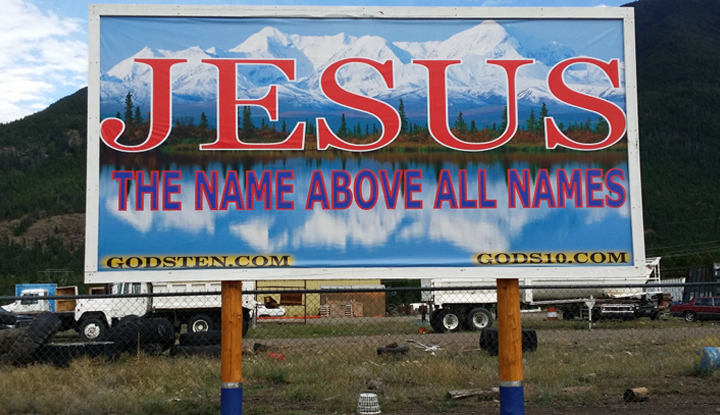I recently received a meme—a digital image with a funny or poignant caption. I don’t have the rights to share the original meme here, but I found the central image of the meme that I can publish. The meme revolved around a billboard just like this, except that the roadside billboard had a common campaign flag placed in such a way that it literally put the name of a political figure above that of Jesus.

The image described serves as a poignant reminder of the phenomenon known as Christian Nationalism—where faith is used as a vehicle for political power, often distorting the gospel’s message. In this case, literally placing the name of Jesus below the political figure.
Now, since I try to avoid partisanship in my preaching and writing, I asked ChatGPT to edit into the photo a flag of the other party running for president. ChatGPT wouldn’t do it. Even artificial intelligence realizes the danger of combining religion and politics in ways that could be inflammatory and break our Wesley’s three simple rules of: avoiding harm; doing good; staying in love with God.
This is a real concern. Replacing Jesus with a political figure weakens both religion and politics and is, quite bluntly, idolatry. The Bible provides clear warnings about the dangers of idolatry, which can take many forms, including the idolization of political leaders or national identity. In Exodus 20: 3-5, God commands, “You shall have no other gods before me… for I, the Lord your God, am a jealous God.” This commandment is a cornerstone in maintaining the purity of worship and allegiance solely to God, not to earthly powers or leaders. But this doesn’t mean that there is a sterile separation between faithfulness and political action.
According to our Social Principles, it is important to maintain a distinction between the church and the state. This separation ensures that the church does not become a tool for political ends and that faith does not endorse or give sanctity to political agendas that may contradict the teachings of Jesus Christ.
How to Avoid and Speak Out Against Christian Nationalism
- Education and Awareness: It is essential for congregations to be educated about the nature of Christian Nationalism and its impact on both faith and society. This awareness can prevent the conflation of patriotism with faith, which can lead to exclusion and division. (That’s what I’m triyng to do with monthly blogs on this topic in campagin season).
- Promoting Inclusive Theology: Emphasizing theological teachings that focus on inclusivity and justice can counteract the exclusivist and often supremacist messages propagated by Christian Nationalism.
- Advocacy for Separation of Church and State: Advocating for clear boundaries between church and state affairs helps ensure that religious practices are not co-opted by political interests and that policies are not dictated by religious factions.
- Prayerful Reflection: Engaging in prayerful reflection about our roles as citizens and as Christians can help us discern when our actions support the kingdom of God versus when they might inadvertently support a political ideology.
As United Methodists, guided by Wesley’s three simple rules—”do no harm, do good, and stay in love with God”—our engagement with politics should always be tempered with the aim of reflecting Christ’s love and justice. Christian Nationalism, by placing the nation and its leaders above or equal to divine authority, disrupts this balance and can lead us away from the gospel’s call. As we continue to reflect on the implications of our faith in the public square, let us strive to uphold the values that promote peace, justice, and the sacred worth of all people, free from the entanglements of political power plays.
Praying for peace in our politics,

